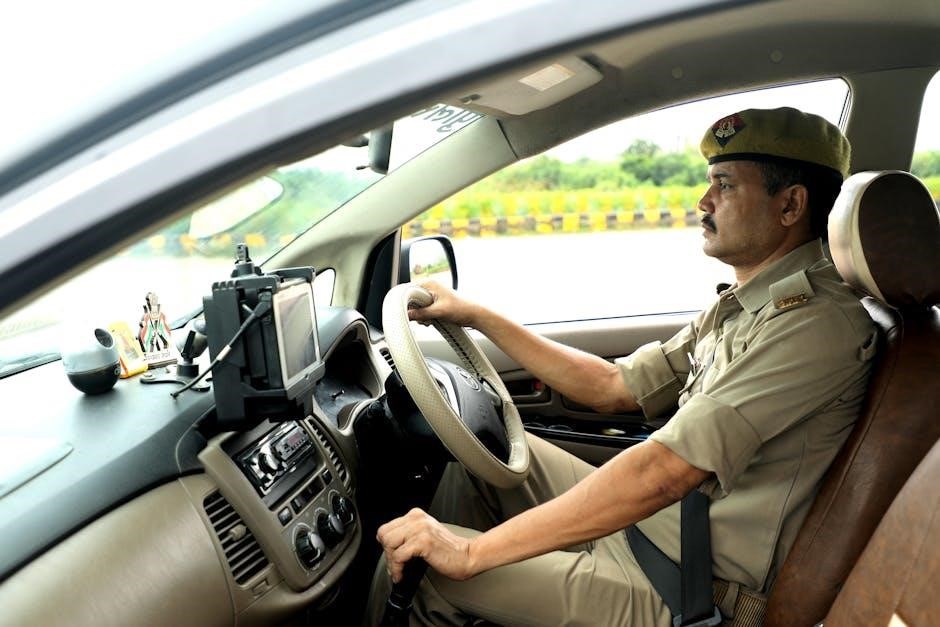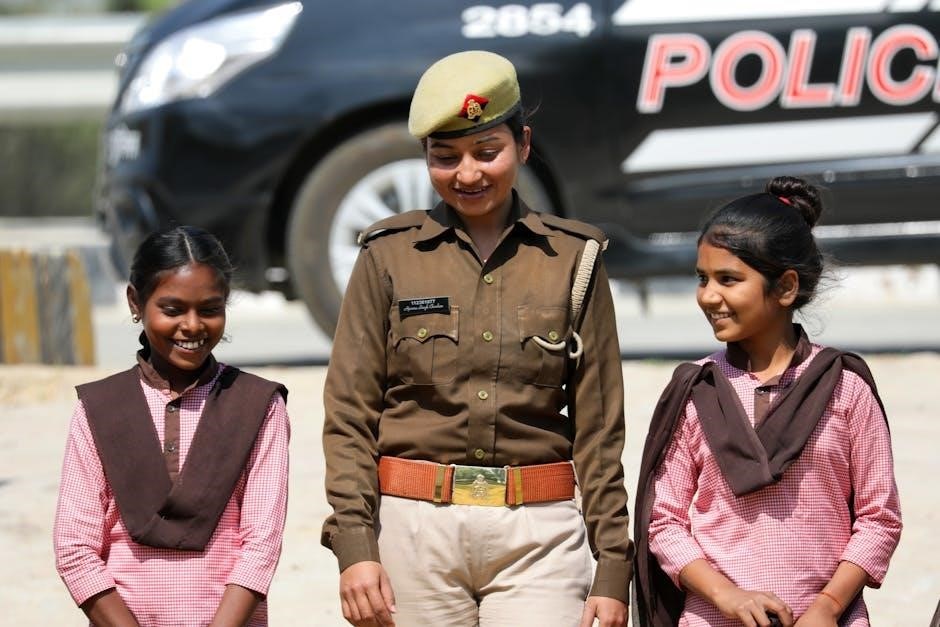
Security officers play a critical role in maintaining safety and security across various environments. Their duties include protecting assets, enforcing policies, and responding to emergencies. Specialized roles like armed officers and executive protection officers require advanced training and skills. Understanding their responsibilities is essential for ensuring effective security protocols and safeguarding individuals and property.
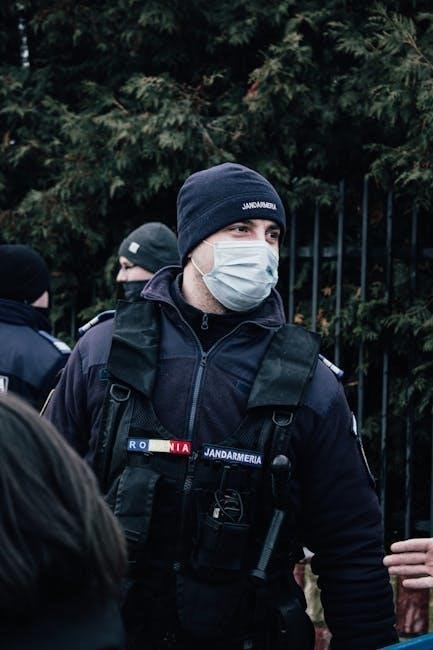
Core Duties and Responsibilities of Security Officers
Security officers are responsible for protecting premises, enforcing policies, and responding to emergencies. They patrol areas, monitor surveillance, and handle access control to ensure safety and security.
Patrolling and Monitoring Premises
Patrolling and monitoring premises are fundamental duties of security officers. They conduct regular inspections of buildings, grounds, and equipment to identify potential risks and ensure everything is secure; This includes checking for safety hazards, unauthorized access, and suspicious activities. Security officers also monitor surveillance systems, such as cameras and alarms, to maintain real-time awareness of their surroundings. Their presence deters criminal activity and provides a sense of safety for employees, visitors, and assets. By systematically patrolling both interior and exterior areas, security officers help prevent incidents before they escalate, ensuring a safe and secure environment for everyone. Their vigilance is key to effective security management.
Access Control and Surveillance
Access control and surveillance are critical components of a security officer’s role. They ensure only authorized individuals enter restricted areas by verifying identities and managing entry points. Security officers operate access control systems, such as keycards, biometric scanners, and visitor management tools, to maintain security protocols. They also monitor surveillance equipment like CCTV cameras, alarms, and motion detectors to detect and respond to potential threats. By controlling access and continuously surveilling premises, security officers prevent unauthorized entry and protect sensitive assets. Their vigilance in monitoring systems helps identify suspicious activities early, enabling timely interventions. Effective access control and surveillance are essential for safeguarding people, property, and confidential information, ensuring a secure environment for all.
Emergency Response and First Aid
Security officers are often the first responders to emergencies, making their role in emergency response and first aid crucial. They must be trained to handle various incidents, such as medical emergencies, fires, and accidents. Their duties include providing immediate assistance, administering basic first aid, and ensuring the safety of everyone involved. Security officers are also responsible for evacuating premises if necessary and coordinating with emergency services. They must know how to use equipment like fire extinguishers and automated external defibrillators (AEDs). Effective communication and quick decision-making are essential in these situations. Their ability to remain calm under pressure helps mitigate risks and prevents further harm. Proper training in emergency procedures and first aid is vital for security officers to fulfill these critical responsibilities effectively and ensure a safe environment for all.
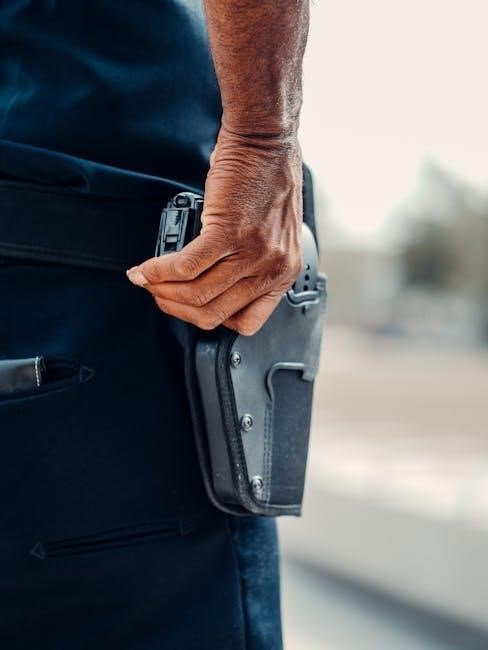
Specialized Roles and Responsibilities
Specialized security roles include armed officers and executive protection officers, who require advanced training for high-risk scenarios. These roles involve protecting high-profile individuals and assets, ensuring safety in critical situations.
Armed Security Officers
Armed security officers are trained to handle high-risk situations, providing advanced protection for individuals, assets, and premises. They are authorized to use firearms and must adhere to strict legal and ethical standards. Their duties include responding to threats, securing sensitive areas, and conducting thorough risk assessments. Armed officers often work in environments requiring elevated security, such as government facilities, financial institutions, or high-profile events. They must possess strong decision-making skills, physical fitness, and the ability to remain calm under pressure. Specialized training in firearms, self-defense, and crisis management is essential for these roles. Armed security officers play a critical role in ensuring safety in potentially dangerous scenarios, making their expertise indispensable in certain settings.
Executive Protection Officers
Executive protection officers specialize in safeguarding high-profile individuals, such as executives, dignitaries, and celebrities. Their primary duty is to ensure the safety and security of their clients in various environments. This includes conducting risk assessments, planning secure routes, and monitoring potential threats. Executive protection officers must remain vigilant, identifying and mitigating risks before they escalate. They often accompany clients during travel, public appearances, and private events, ensuring a secure environment. Strong communication and situational awareness are critical skills for this role. Additionally, they must maintain professionalism and discretion when handling sensitive information. Executive protection officers play a vital role in protecting valuable individuals and maintaining their ability to operate safely and effectively in high-stakes settings.
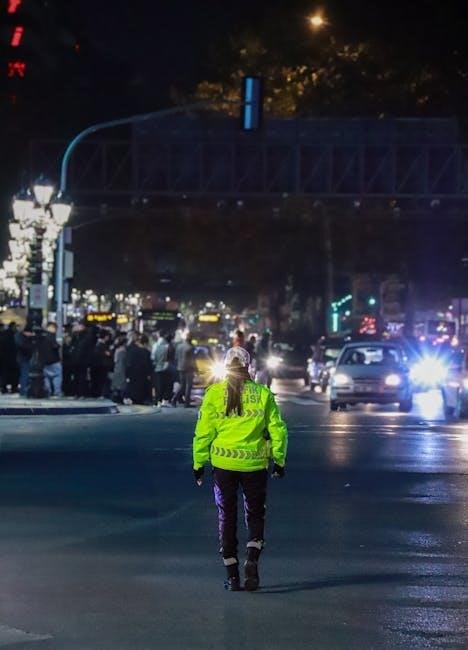
Skills and Qualifications Required
Security officers must possess a combination of skills and qualifications to perform their duties effectively. Strong communication and interpersonal skills are essential for interacting with diverse groups. Physical fitness and the ability to respond quickly in emergencies are critical. They must also have keen observational skills to detect potential threats. Basic first aid and emergency response knowledge are often required. Additionally, proficiency in using security equipment, such as surveillance systems and access control devices, is necessary. Many employers require certifications in security protocols, CPR, or firearms training. A clean criminal record and reliability are also key qualifications. Advanced roles may demand specialized training or licenses. These skills ensure security officers can maintain safety, enforce policies, and handle crises efficiently while adhering to legal and ethical standards;
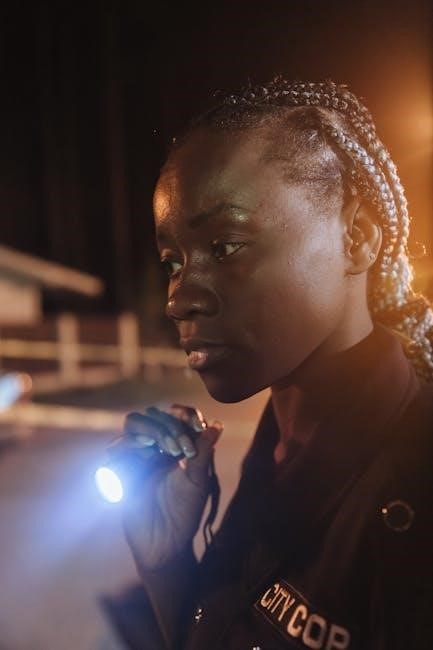
Tools and Equipment Used by Security Officers
Security officers utilize a range of tools and equipment to carry out their responsibilities effectively. Surveillance cameras, access control systems, and intercoms are essential for monitoring premises and managing entry points. Communication devices like two-way radios and telephones enable quick response during emergencies. They also use alarm systems to detect unauthorized access or potential threats. Additionally, security officers may carry batons, pepper spray, and handcuffs for maintaining order. Firearms are used by armed officers in high-security environments. First aid kits are crucial for providing immediate medical assistance. Vehicles are often employed for patrolling large areas. Effective use of these tools ensures the safety of personnel, assets, and property. Proper training on equipment operation is vital to perform duties efficiently and responsibly.
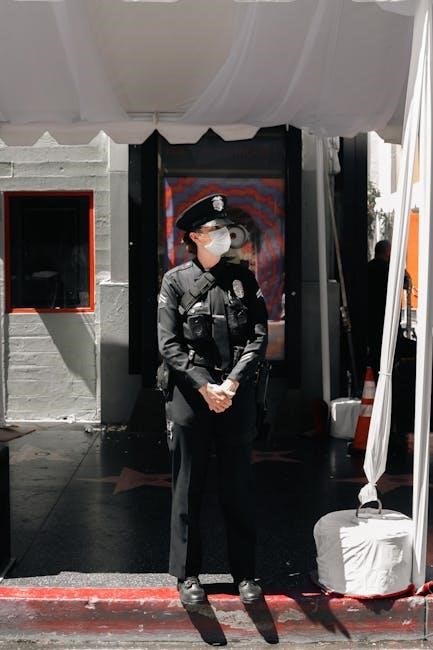
Legal and Ethical Considerations
Security officers must adhere to legal and ethical standards while performing their duties. This includes complying with local laws, respecting privacy rights, and avoiding excessive use of force. They are expected to maintain confidentiality when handling sensitive information and ensure that their actions align with organizational policies and ethical guidelines. Understanding legal frameworks, such as data protection laws and surveillance regulations, is crucial to avoid violations. Ethical considerations involve upholding professionalism, integrity, and fairness in all interactions. Proper training on legal and ethical practices helps security officers navigate complex situations responsibly, ensuring they protect both people and property without overstepping their authority. Adhering to these principles is essential for maintaining public trust and operational legitimacy in the security profession.
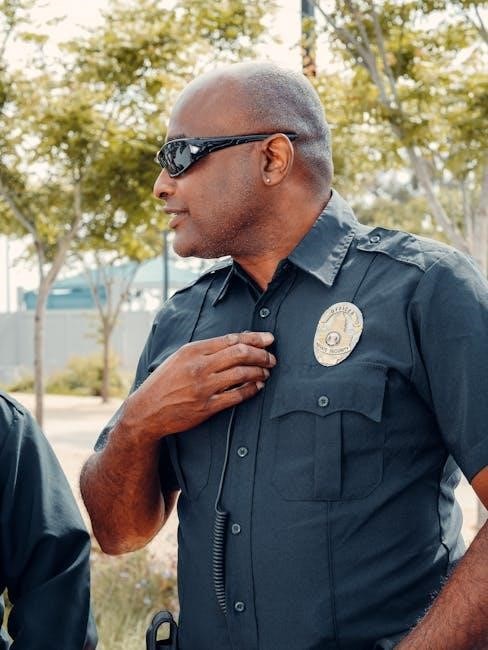
Training and Certification
Security officers undergo comprehensive training to effectively perform their duties. Standard programs include crisis management, emergency response, and legal awareness. Many complete certifications like CPR/First Aid and self-defense techniques. Specialized roles require advanced training in firearms and executive protection. Certifications often involve passing background checks and exams. Continuous learning ensures officers stay updated on new threats and technologies. Employers may mandate periodic recertification to maintain proficiency. Ethical conduct and professionalism are emphasized throughout training. Certification programs vary by jurisdiction but typically cover foundational security principles. Proper training ensures officers can handle diverse scenarios responsibly and effectively, upholding safety and legal standards in their roles.
Industry-Specific Security Roles
Security officers often specialize in roles tailored to specific industries, requiring unique skills and knowledge. In healthcare, they focus on patient and asset protection, while in retail, preventing theft is a priority. Educational institutions rely on security officers to ensure campus safety, often collaborating with law enforcement. Corporate settings may emphasize access control and data security. Industrial environments require monitoring of large facilities and equipment. Each industry demands adaptability to its particular risks, such as hospitals needing biohazard protocols or stadiums requiring crowd control expertise. Understanding these variations is crucial for effective security management across diverse sectors.
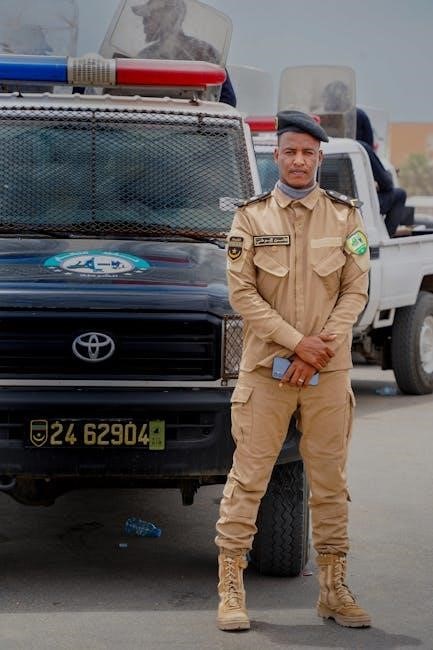
Career Advancement and Professional Development
Security officers can advance their careers through specialized training, certifications, and experience. Starting as entry-level guards, they can progress to senior roles like supervisors or specialized positions such as Chief Security Officer (CSO) or Chief Information Security Officer (CISO). These advanced roles require expertise in risk management, cybersecurity, and leadership. Professional development opportunities include certifications like Certified Security Professional (CSP) or Physical Security Professional (PSP). Staying updated on industry trends and earning advanced certifications can open doors to higher-paying and more responsible positions. Continuous learning and adapting to new security challenges are key to long-term success in this evolving field.
